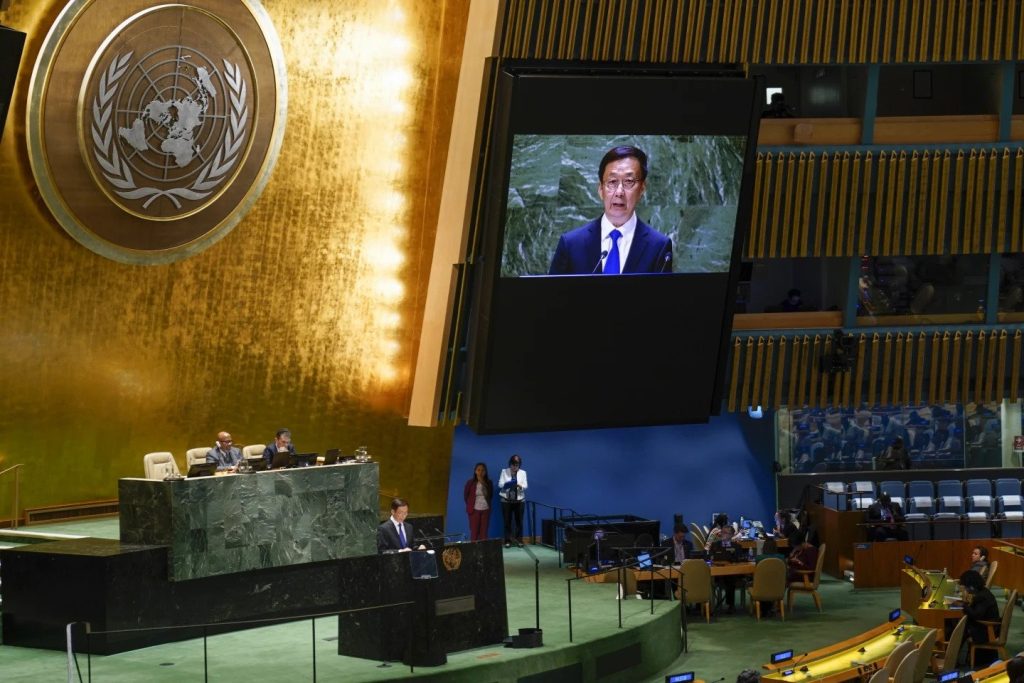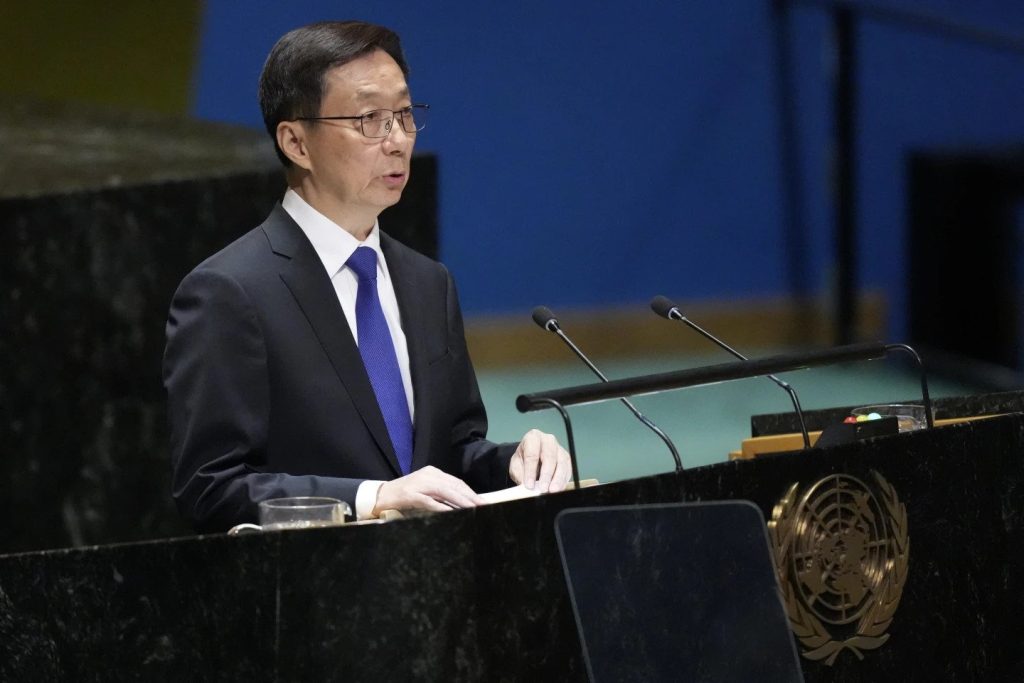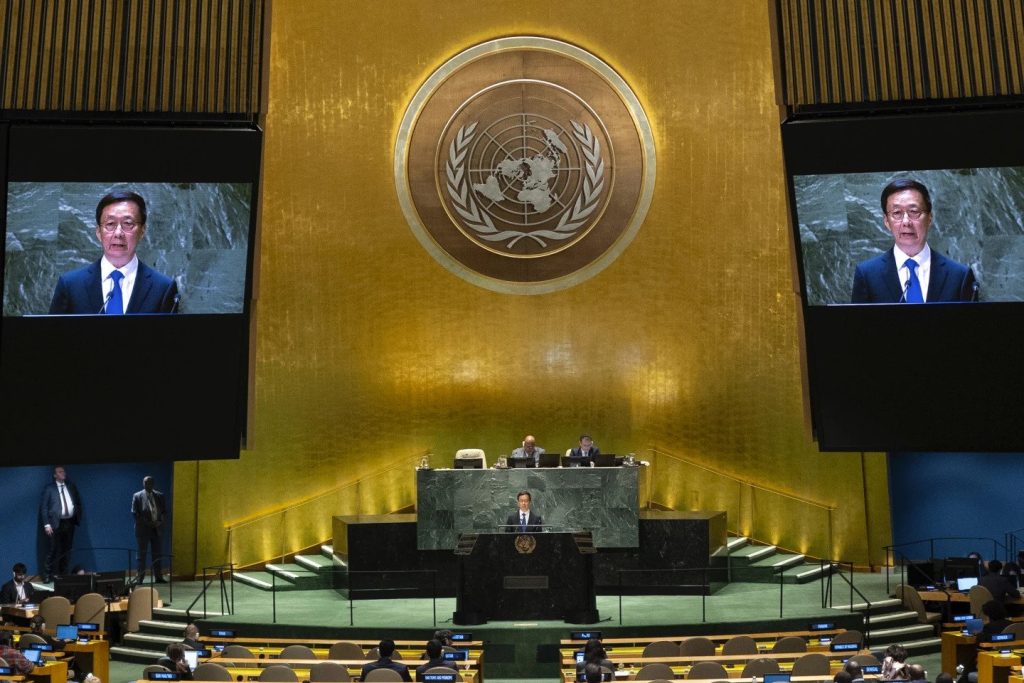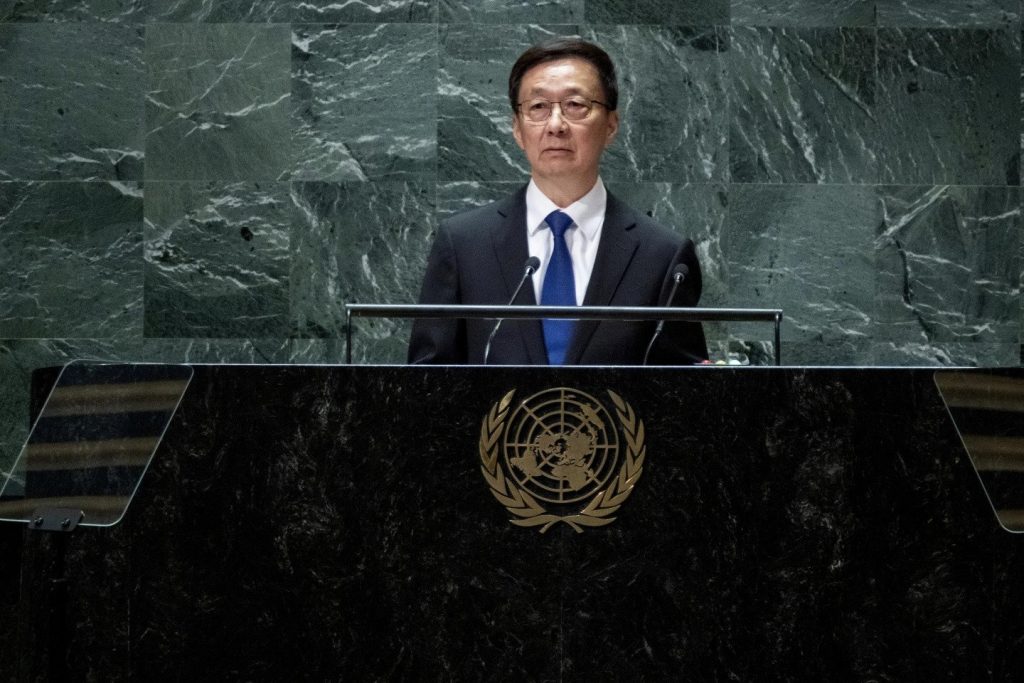


UNITED NATIONS (AP) — China told assembled world leaders Thursday that it considers itself part of the Global South, saying it identifies with the goals and challenges of less-developed nations and offering them an alternative to what it has long called “Western hegemony.” The message came from a second-tier official after the country’s powerful president, Xi Jinping, skipped the annual U.N. meeting again.
Xi sent Vice President Han Zheng to deliver a policy statement at the General Assembly’s leaders’ meeting that covered the government’s usual positions with familiar language but appeared to focus on building coalitions around its approach to development and international relations.
“As the largest developing country, China is a natural member of the Global South. It breathes the same breath with other developing countries and shares the same future with them,” Han said. He also said China supports those nations’ development path “in keeping with their national conditions.”
The loosely defined term “Global South,” which has come up frequently at the United Nations this year, identifies nations around the world that are less developed and less rich than what have typically been called “first-world nations.” They’re not necessarily in the Southern Hemisphere; many, in fact, are not.
Leaders of a number of larger developing nations, including Brazil’s Luiz Inacio Lula da Silva and India’s Narendra Modi, have of late pitched themselves as leaders around whom the Global South could coalesce. Just Tuesday, Lula told leaders at the U.N. meeting that “Brazil is back” in a speech widely received as Global South-focused maneuvering. And Modi in January hosted a “Voice of the Global South” virtual summit.
China, too, has loosely cast itself in a similar role for more than a decade — and more so since Xi launched the “Belt and Road Initiative” to drive Chinese development, infrastructure and influence in other nations, particularly developing ones. The sprawling project has been widely touted but has encountered bumps along the way.
“China,” Han promised, “will remain a member of the big family of developing countries.”
That statement is in keeping with Beijing’s attempts to balance — often adeptly — the benefits of continuing to be a developing nation with the advantages of being a major global economic and diplomatic power and counterbalance to the West.
For decades, since the start of the “reform and opening up” launched by Deng Xiaoping after Mao Zedong’s death in 1976, China has positioned its approach to both domestic and international affairs as an alternative to “Western hegemony.” That counternarrative is a frequent cornerstone of its international identity. Han’s “Global South” statements Thursday match that longtime sensibility.
And China benefits from association with the Global South, which allows it to style statements as if it speaks for many nations — nations that may not be strong enough to object if such a powerful government mischaracterizes them.
Whether China and its $18 trillion GDP should actually be considered part of the Global South is a frequently debated matter. In January, at Modi’s summit, 125 countries were included but China wasn’t one of them. That may have had more to do with China’s often-tense relations with India than with its attitude toward the concept in general.
Xi was one of four leaders of permanent U.N. Security Council members who did not show at the United Nations this week. France’s Emmanuel Macron, Britain’s Rishi Sunak and Russia’s Vladimir Putin also skipped it; U.S. President Joe Biden, leader of the host nation, was the only permanent Security Council member to deliver a speech.
Han Zheng’s presence at the United Nations came at a time when China’s diplomatic operation appears to be in a bit of disarray.
Many expected Foreign Minister Wang Yi to come to the General Assembly and possibly pave the way for a Xi-Biden meeting. Wang attended and delivered the speech last year. In the months since, a newly appointed foreign minister came and went with some mystery, and Wang took the role on again.
Han, in his speech, covered China’s usual topics in such meetings. Among them:
— He reiterated that Taiwan, the island off China’s coast that has its own independent government, is historically a part of China and always will be — a frequent message to the United States and the world. The island and the mainland split in 1949 after a civil war.
— He said China supported human rights “suited to our national conditions in response to the needs of our people.” Beijing’s repressive policies toward ethnic Uyghurs in the western region of Xinjiang and its policies toward dissent, including in the special administrative region of Hong Kong, come under frequent Western scrutiny.
— He said, as China has many times before, that a cease-fire and peace talks are the only path to ending war in Ukraine. China has tread a delicate line in the 18 months since Russia invaded Ukraine in February 2022.

